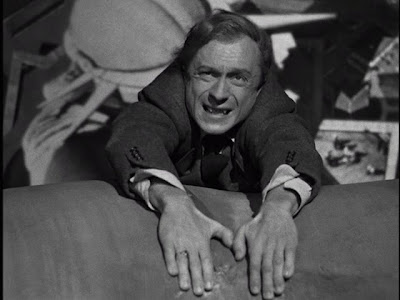
Maybe it's better to look at Source Code (2011) as a great little trainbound "B" movie like the original Narrow Margin, because it effectively ends at about the 70-minute mark. Hero Jack Gyllenhall solves the mystery, foils and captures the villain and saves Chicago. (Hope that's not a spoiler for anybody, but do you really think a little movie like this had the guts to destroy a major American city? It's released by Summit, for heaven's sake. It takes a Paramount or Disney to destroy major real estate.
Seriously, and I do mean seriously, screenwriter Ben Ripley, whose first produced screenplay this is after 16 years in the business, and Duncan Jones, who made the similarly and more successfully claustrophobic Moon, have thing they want to say about love, identity and indeed what it is to be human. Problem is, they never really signalled us that this was the way they were going to go. We signed on for a popcorn roller coaster ride, not a meditation on mortality, and the solution to the mystery of why what starts as a cracking good thriller, Groundhog Day On A Train With A Bomb only grossed $54 million is answered by the 20-minute appendix, which even on its own terms makes no sense.
Seriously, and I do mean seriously, screenwriter Ben Ripley, whose first produced screenplay this is after 16 years in the business, and Duncan Jones, who made the similarly and more successfully claustrophobic Moon, have thing they want to say about love, identity and indeed what it is to be human. Problem is, they never really signalled us that this was the way they were going to go. We signed on for a popcorn roller coaster ride, not a meditation on mortality, and the solution to the mystery of why what starts as a cracking good thriller, Groundhog Day On A Train With A Bomb only grossed $54 million is answered by the 20-minute appendix, which even on its own terms makes no sense.
You see, Jake Gyllenhall is inhabiting another guy's body. Not really, because it's all some of kind of simulation-that's-not-a-simulation kind of thing. Anyway, to "the girl" he looks like some other guy she knows only slightly, but inside he's Mr. JG. And she falls in love with that hybrid guy in 8 minutes, and they will spend eternity together in simulated-Chicago-heaven. Really, there's nobody that can explain this higgledy piggledy ending. I'm sure they think it's profound and something out of The Twilight Zone but it's just ill-conceived, poorly executed and made no sense to begin with.
Here's the deal -- you gotta dance with the guy what brung ya. Walk in a thriller -- you can do some awesome non-thriller stuff, meaning of life and all that stuff -- but you have to keep the thrills going right to the end, or you're going to get a reputation, and not a good one.
Another case in point, Rango (2011). Of course the big question here is just who this movie was made for, other than Johnny Depp and Gore Verbinski's friends. For one thing, much of its time is taken up with a parody of both classical and spaghetti Westerns. Yeah, that's what Westerns need, a good kidding. First of all, nobody's ever done it before. Second, it's such a robust and popular genre today. I can't wait for Mr. Verbinski's scorching take-off on silent German mountain movies, and then a hot rip on Ruth Chatterton, whose popularity waned around 1932. That'll be a hoot!
As if that was not enough of an entertainment treat, the movie can't even decide what its story is. There is a rule that movies need to make a promise to the audience within the first ten minutes, narratively-speaking. Rango not only doesn't promise, it's still being coy and hinty past the 20-minute mark. This was bad enough in the 3rd Pirates movie (I wasn't masochistic enough to see the 4th) when Johnny D wandered around in a white void for 20 or 25 minutes for no apparent reason. I remember there was a lizard in that, too.
But animation is best when it is most efficient. Rango is positively roccoco. At one point, the characters all got on their birds and began to ride (they're too small to ride horses) and before they got where they were going, so many things happened I couldn't remember what their intended destination and purpose was. Clearly, this movie was intended for 82-year-old teenage boys, who can still get excited about things but can't remember what or why.
Johnny Depp is, however, a terrific voice actor, and that is part of the problem. He doesn't settle on a voice we can identify as the hero of the story. It's OK for Robin Williams as the Genie, to scramble through all his canned impressions of extinct celebrities. You're not rooting for the Genie (at least not much). But Rango is supposed to be the center of the story and I know he's a chameleon, but the film doesn't even make that fact interesting or endearing.
The curious thing is that Rango is funny all the way through. My wife and I laughed consistently in nearly every scene. There was always a clever reference, an hilarious non-sequitur, a peculiar bit of characterization. But nothing amounted to anything, nothing added up, and the stakes never seemed to matter (although we were talking about water, which means survival, nobody seemed committed to anything more than the next joke). It's like sitting down to a meal and then eating a whole bag of potato chips. (Not as if I've ever actually done that. I'm just imagining what it would be like, you see.) Lord, knows them chips is tasty but when you're done you feel oogy and sick and bloated and your body is still craving nutrition, just as your mind will crave an actual story after 107 (!!!) minutes of Rango.





No comments:
Post a Comment